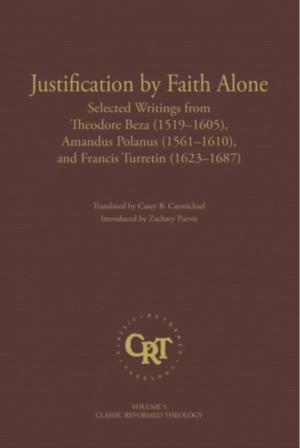From its inception, the goal of the Classic Reformed Theology Series from Reformation Heritage Books (sponsor of the Heidelcast) has been to present, in English, primary source texts in Reformed theology. This new volume is the sixth in the series, which began . . . Continue reading →
Justification
Trent’s Knowing And Intentional Rejection Of Justification Sola Fide
After theologians the bishops took the floor, song speaking for two or more hours at a time. Some were well-versed in the subject. Their approach, like that of theologians, was generally framed by Scholastic categories, and, despite Pole’s words, they often seemed . . . Continue reading →
On Justification In Romans And Hebrews
One does not often think of Hebrews when it comes to the doctrine of justification—we normally go right to Paul’s writings. Continue reading
Haldane: “Ungodly” In Romans 4:5 Means What It Says Just As “Works Not” Means What It Says
Ver. 5. —But to him that worketh not, but we leave it on him that justifies the ungodly, his faith is counted for righteousness. But to him that worketh not.—This is entirely misunderstood by Dr. Macknight and Mr. Stuart, as if it . . . Continue reading →
Romans 5:9–10: You Were Justified And You Shall Be Saved Sola Gratia, Sola Fide
For many evangelicals and for some ostensibly Reformed folk it has been fashionable for the last several years to teach that we are justified now by grace alone (sola gratia), through faith alone (sola fide), on the basis of Christ’s righteousness imputed . . . Continue reading →
Heidelcast 219: Our Father (9): “Forgive Us Our Debts” (Plus Dr Clark Answers Heidelmail And Heideltexts)
In this episode Dr Clark answers Heidelmail from Kwan about what Acts 2:42 and signs and wonders, from Exile1986 about how to answer a child’s question about why we cannot see Jesus right now, and from Jerome about an expression in Dane . . . Continue reading →
Trent Is Nature, Heidelberg Is Grace
We all naturally hold to the article of justification expressed in the Council of Trent, Continue reading
Perkins: As Soon As One Believes
For so soon as a man believes, he is presently justified. For every believer has… Continue reading →
Perkins On “The Exclusive Particle”
Throughout his works Perkins objected to the idea that one was justified by a mixed faith. On the contrary, faith was to be regarded as an instrument “to apprehend and apply that which justifies, namely, Christ and His obedience.” Perkins saw justifying . . . Continue reading →
With The Pactum Podcast On “Do This And Live”
Pat Abendroth is a friend and pastor of Omaha Bible Church and the host of The Pactum Podcast. Pactum is a Latin noun for covenant. You might see or hear it used, e.g., to refer to the pactum salutis, the covenant of redemption between . . . Continue reading →
James Does Not Contradict Paul And Vindication Is Distinct From Justification
And There Is Plenty Of Courtroom Language In The New Testament
Why did James say “justify” if he did not mean to indicate that there is either a second way of justification (e.g., by works) or if he did not mean to signal that works somehow play some role other that fruit and evidence. Continue reading →
A Brief But Important Quotation By Mr Murray On Romans 2:13
Philippi’s statement is worthy of quotation: “Whether or not there are such perfect ποιηται του νομου [doers of the law] the apostle does not say in this passage, but only opposes the true standard to the false standard of the Jews, that . . . Continue reading →
A Timely Reminder: James 2:24 Does Not Teach Justification Before God By Works
“You see that a person is justified by works and not by faith alone.”— James 2:24 It’s not uncommon to hear some people appeal to James 2:24 in order to argue that God saves people by faith plus works. In particular, some . . . Continue reading →
Owen: The Loss Of Justification Sola Fide Leads To Rome Or Atheism
I shall take the boldness, therefore, to say, whoever be offended by it, that if we lose the ancient doctrine of justification
Heidelcast 205—What Must A Christian Believe? (21): The Forgiveness Of Sins (3)
This is episode 21 in the series, What Must A Christian Believe? In our survey of the rule of faith, i.e., the Apostles’ Creed, we are completing our brief study of the tenth article, “the forgiveness of sins.” The doctrine of justification . . . Continue reading →
Heidelcast 204—What Must A Christian Believe? (20): The Forgiveness Of Sins (2)
This is episode 20 in the series, What Must A Christian Believe? In our survey of the rule of faith, i.e., the Apostles’ Creed, we have reached the tenth article, “the forgiveness of sins.” The truth of our righteousness with God is essential . . . Continue reading →
William Perkins On Justification (2)
In connection with Trent and Bellarmine’s stance on purgatory and the sacrifice of the Mass was Rome’s doctrine of a second justification. Bellarmine’s Scriptural basis for a second justification was Romans 3—which he saw as the first justification, and James 2—which he saw as the second justification. For Perkins, James 2 was for the justified because of Christ, “outward testimonies of the truth of our faith and profession, proving that the grace of our hearts is not in hypocrisy, but in truth and sincerity.” In other words, James 2 spoke not of justification in the same sense as Paul in Romans, but in a completely different sense, scope, and design, James 2:21 is in the demonstrative for Abraham’s “works did testify that his faith was true and sincere. Continue reading →
William Perkins On Justification
Perkins objected to Rome’s sacrifice of the Mass. For Perkins, this doctrine was attached to erroneous views of Christology, Christ’s propitiatory suffering unto death, and in turn the doctrine of justification. One of Perkins’s clearest Christological statements is found in his treatise, A Warning Against the Idolatry of the Last Times (1601), where he wrote, “For He in one person is perfect God and perfect man, our only Redeemer all-sufficient in Himself, and therefore perfect king, priest, prophet; without either partner or fellow in the work of man’s salvation.” Continue reading →
Heidelcast 202—What Must A Christian Believe? (19): The Forgiveness Of Sins (1)
This is episode 19 in the series, What Must A Christian Believe? In our survey of the rule of faith, i.e., the Apostles’ Creed, we have reached the tenth article, “the forgiveness of sins.” That phrase does not occur in the earliest . . . Continue reading →
On Whose Record Will You Stand?
Just pause and think of what it meant for the Lord Jesus to obey for us, in our place. For thirty years he never once said or did anything wrong. More than that, at every single moment he positively said and did . . . Continue reading →





